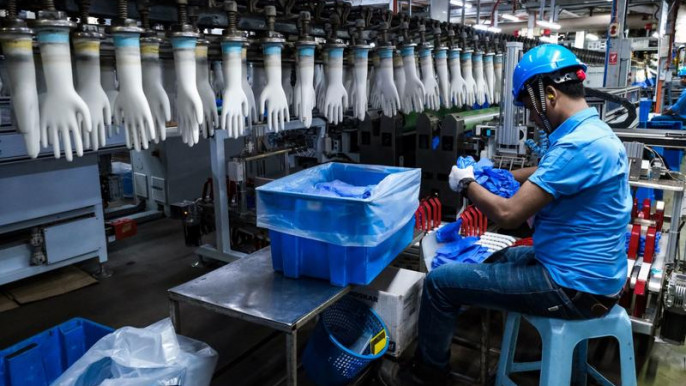AG’s report: HR, Home ministries must decide who takes full ownership of Malaysia’s foreign worker management system
Comments by Andy Hall – International Migrant Worker Rights Specialist
This recent report, just published by the Attorney General’s office in Malaysia and reported by Bernama, seems to sum up well that Malaysia’s foreign worker management system is essentially broken, systemically flawed, and devoid of the rule of law, leading to corruption, impunity, and dysfunction.
Original Source: malaymail – 22nd November 2023
This situation leads to the appalling mess we see today in Malaysia, particularly with foreign worker quotas being issued for jobs that don’t exist and to bogus employers (or Malaysian agents) who end up becoming irregular outsourcing agencies without work, which leaves 100,000s of indebted workers destitute, desperate and abused.
Alongside unethical and ever-increasing exorbitantly costed recruitment processes faced by foreign workers today, this all creates ripe conditions for systematic forced labour and modern slavery to exist throughout Malaysia through debt bondage, deception, isolation, document confiscation, and many more of the ILO’s defined forced labour indicators.
Obviously, there are many things that need fixing when it comes to the issue of migrant workers in Malaysia.
What more should the government do, and how does that exist alongside the AG’s report recommendations?
There is so much systemic corruption in the country as regards migrant worker issues. What is needed now is for the prime minister to take control of this issue himself urgently. Malaysia’s migration policy needs to be dictated by a leader, a prime minister because it is such an important issue for Malaysia. Putting migration issues under the auspices of the Ministry of Human Resources (MoHR) is naive and impractical; it cannot work on many levels.
There are so many migrant workers in Malaysia now. Perhaps a majority are still irregular, and this concerning issue therefore, needs to be controlled from the top. Migration cannot be controlled by just the Ministry of Home Affairs (MoHA) either because migration has three aspects — national security, economic security and human security. MoHA focuses on national security, so it is not the agency that should be controlling migration. MoHR focuses on labour and labour protection, not security, health, economics, so it’s not suitable either.
This all leads to the conclusion that Malaysia’s prime minister needs to take control of this migration issue and have a task force urgently set up at the highest level, whereby migration policy is developed holistically and sensibly for the long-term sustainable future of Malaysian society, culture, and economy.
I have always believed the issue of migration in Malaysia should be under the Prime Minister’s office or an independent agency tasked with migration management chaired by the Prime Minister or his deputy.
The whole system of developing and implementing migration policy is currently not working, and these systemic policy failures need to be addressed at the top of the Malaysian government urgently and coordinated properly in the long term to take into account national, economic, and human security issues.
A-G’s report: HR, Home ministries must decide who takes full ownership of foreign worker management system
Original Source: malaymail – 22nd November 2023
According to the Auditor-General’s Report (LKAN) 2022, the system used should have interoperability, scalability and sustainability features to carry out foreign worker management processes seamlessly, ensuring effective management, monitoring and control of foreign workers.
The Human Resources Ministry (KSM) and the Home Ministry (KDN) should discuss and decide on who will be fully responsible for the foreign worker management system without neglecting the needs of all stakeholders.
According to the Auditor-General’s Report (LKAN) 2022, the system used should have interoperability, scalability and sustainability features to carry out foreign worker management processes seamlessly, ensuring effective management, monitoring and control of foreign workers.
This is after the management of foreign workers through the Foreign Workers Integrated Management System (ePPAx) and the Foreign Workers Centralised Management System (FWCMS) under KSM was found to be unsatisfactory.
According to the report, the ePPAx system, with a development cost of RM19.39 million, cannot be used optimally due to limited use in the qualification quota recommendation process through only the issuance of certificates by the Department of Labour of Peninsular Malaysia (JTKSM)
“Besides this, the quota approval process by KDN’s Local Approval Centre (OSC) is also not implemented using the OSC Module in the ePPAx System, and the decision of the Cabinet to use FWCMS for the management of foreign workers.
“There are also weaknesses in the management of the ePPAx system, namely system settings being changed and quota applications made out of the Labour Recalibration Programme (RTK) period,” the report, presented in the Dewan Rakyat today, stated.
The report also stated that the achievements under FWCMS’ implementation cannot be assessed yet because all 12 complete modules are only used for one source country, Bangladesh, compared to the 15 source countries allowed.
In addition, there are weaknesses in the implementation of the system, such as agreements yet to be signed, government rights that cannot be determined, unclear implementation methods and direction, early filtering functions, deactivation of quota eligibility calculation and irregular control of user identification (ID).
The audit report also recommends that KSM and KDN implement an efficient, transparent and integrity-focused foreign worker management process that includes all foreign worker management processes that occur within and outside the system, taking into account the rights and jurisdiction of the involved agencies.
The audit also proposed that both ministries ensure that the system used has quota limit control as a mechanism for controlling the approval of foreign workers according to the country’s labour needs and that the foreign worker management system complies with government regulations to guarantee the rights and interests of government and national security.
See more: 20th Oct 2023 Malaysiakini: Long-awaited foreign worker management report declassified in Malaysia
See more: 19th Oct 2023: Malaysia facing huge excess of 1/4 million migrant laborers
See more: 2nd Oct 2023: Exploitation of migrant workers continues unabated in Malaysia


